![じゃない・ではありません – Expressing 'Is/Was Not' in Japanese [JLPT N5]](http://hirakan.com/cdn/shop/articles/janai-dehaarimasen_2594963b-531e-4f4d-a9b0-361010e0a720.jpg?v=1760865884&width=1100)
じゃない・ではありません – Expressing 'Is/Was Not' in Japanese [JLPT N5]
Share
Quick Summary
Meaning: The negative of the copula “to be.” Say “is not” or “was not” with nouns and na-adjectives.
How to Use: Put it after a noun or a na-adjective.
Example:
- この犬は社長じゃない。
- Kono inu wa shachou janai.
- This dog is not a company president.
Overview
Use this grammar to say something is not or was not. It is the negative form of the copula だ (da, be) / です (desu, be). There are two styles:
- じゃない: casual present negative (“is not”)
- ではありません: polite present negative (“is not”)
- じゃなかった: casual past negative (“was not”)
- ではありませんでした: polite past negative (“was not”)
Attach these directly to a noun like 学生 (gakusei, student) or to a na-adjective like 静か (shizuka, quiet). They do not attach to i-adjectives (like たかい (takai, tall/expensive)).
In speech, では (de wa) often contracts to じゃ (ja). The polite form ではありません sounds more formal and is safe for class, tests, and talking to strangers. The casual じゃない is for friends and family.
Structure / Formation
Base Patterns
- N + じゃない
- N + ではありません
- N + じゃなかった
- N + ではありませんでした
- na-adj + じゃない
- na-adj + ではありません
- na-adj + じゃなかった
- na-adj + ではありませんでした
- N1 + は + N2 + じゃない / ではありません
Four Core Forms at a Glance
| Politeness | Present | Past | Meaning |
|---|---|---|---|
| Casual | じゃない | じゃなかった | is not / was not |
| Polite | ではありません | ではありませんでした | is not / was not |
Present Negative (“is not”)
State that something is not true now. Use the topic marker は before it if you are talking about the topic.
- 祖父はアイドルではありません。
- Sofu wa aidoru de wa arimasen.
- My grandpa is not an idol.
Past Negative (“was not”)
Talk about something that was not true in the past.
- 昨日、私は宇宙人じゃなかった。
- Kinou, watashi wa uchuujin janakatta.
- Yesterday, I was not an alien.
With na-adjectives
Attach directly to a na-adjective like 静か (shizuka, quiet) or きれい (kirei, pretty/clean).
- ここは静かではありませんでした。
- Koko wa shizuka de wa arimasen deshita.
- It wasn’t quiet here.
What about i-adjectives?
i-adjectives do not use this pattern. They make negatives with i-adj-くない (present) and i-adj-くなかった (past). For example: たかい (takai, expensive) → たかくない (takakunai, not expensive), たかくなかった (takakunakatta, was not expensive).
Usage Tips
- では → じゃ is a common contraction in speech. Polite speech keeps ではありません; casual speech uses じゃない.
- じゃありません is also used in conversation as a slightly less formal polite negative.
- じゃないです is common in spoken polite Japanese (e.g., 学生じゃないです). For very formal contexts, prefer ではありません.
Example Sentences
- このバナナは電話じゃない。
- Kono banana wa denwa janai.
- This banana is not a phone.
- この冷蔵庫はタイムマシンではありません。
- Kono reizouko wa taimumashin de wa arimasen.
- This refrigerator is not a time machine.
- 昨日、月はチーズじゃなかった。
- Kinou, tsuki wa chiizu janakatta.
- Yesterday, the moon was not cheese.
- 私の金魚は有名ではありませんでした。
- Watashi no kingyo wa yuumei de wa arimasen deshita.
- My goldfish was not famous.
- このトマトは元気じゃない。
- Kono tomato wa genki janai.
- This tomato is not energetic.
Quick Practice
(Answers and explanations are right under this section.)
Multiple-Choice
-
Choose the sentence that correctly uses ではありません (polite present negative).
- A. このロボットは先生ではありません。 (Kono robotto wa sensei de wa arimasen.)
- B. このロボットは先生じゃなかった。 (Kono robotto wa sensei janakatta.)
- C. このロボットは先生やありません。 (Kono robotto wa sensei ya arimasen.)
- D. このロボットは先生とではありません。 (Kono robotto wa sensei to de wa arimasen.)
-
Choose the sentence that correctly uses じゃなかった (casual past negative).
- A. 昨日、私の金魚はドラゴンじゃなかった。 (Kinou, watashi no kingyo wa doragon janakatta.)
- B. 昨日、私の金魚はドラゴンではありません。 (Kinou, watashi no kingyo wa doragon de wa arimasen.)
- C. 昨日、私の金魚はドラゴンくなかった。 (Kinou, watashi no kingyo wa doragon kunakatta.)
- D. 昨日、私の金魚はドラゴンでもありません。 (Kinou, watashi no kingyo wa doragon demo arimasen.)
-
Pick the correct polite past negative sentence with a na-adjective (静か).
- A. 図書館は静かではありませんでした。 (Toshokan wa shizuka de wa arimasen deshita.)
- B. 図書館は静かじゃないでした。 (Toshokan wa shizuka janai deshita.)
- C. 図書館は静くないです。 (Toshokan wa shizuku nai desu.)
- D. 図書館は静かとではありませんでした。 (Toshokan wa shizuka to de wa arimasen deshita.)
-
Choose the correct casual present negative sentence.
- A. このピザは朝ごはんじゃない。 (Kono piza wa asagohan janai.)
- B. このピザが朝ごはんではありませんです。 (Kono piza ga asagohan de wa arimasen desu.)
- C. このピザや朝ごはんじゃない。 (Kono piza ya asagohan janai.)
- D. このピザは朝ごはんくない。 (Kono piza wa asagohan kunai.)
-
Pick the correct polite past negative sentence with 有名.
- A. 去年、私のカメは有名ではありませんでした。 (Kyonen, watashi no kame wa yuumei de wa arimasen deshita.)
- B. 去年、私のカメは有名じゃない。 (Kyonen, watashi no kame wa yuumei janai.)
- C. 去年、私のカメは有名ではなかったでした。 (Kyonen, watashi no kame wa yuumei de wa nakatta deshita.)
- D. 去年、私のカメは有名とではありませんでした。 (Kyonen, watashi no kame wa yuumei to de wa arimasen deshita.)
Spot-the-Error
-
One sentence has an error with the negative copula. Which one?
- A. 私の時計はチョコレートじゃない。 (Watashi no tokei wa chokoreeto janai.)
- B. この部屋はきれいではありません。 (Kono heya wa kirei de wa arimasen.)
- C. 彼は宇宙人だない。 (Kare wa uchuujin danai.)
-
Find the sentence with the mistake (focus on i- vs. na-adjectives).
- A. そのサメは学生ではありません。 (Sono same wa gakusei de wa arimasen.)
- B. 昨日、空はチーズじゃなかった。 (Kinou, sora wa chiizu janakatta.)
- C. このりんごは高いじゃない。 (Kono ringo wa takai janai.)
Translation
- Translate into Japanese using the target grammar: My dog is not a doctor.
- Translate into Japanese using the target grammar: Yesterday, my pizza was not breakfast.
- Translate into Japanese using the target grammar: Last night, the park was not quiet.
Answers and Explanations
- A. このロボットは先生ではありません。 (Kono robotto wa sensei de wa arimasen.) Uses ではありません for a polite present negative with a noun.
- A. 昨日、私の金魚はドラゴンじゃなかった。 (Kinou, watashi no kingyo wa doragon janakatta.) じゃなかった is the casual past negative of the copula.
- A. 図書館は静かではありませんでした。 (Toshokan wa shizuka de wa arimasen deshita.) Na-adjectives take ではありませんでした for polite past negative.
- A. このピザは朝ごはんじゃない。 (Kono piza wa asagohan janai.) Casual present negative with the topic marker は is the correct pattern.
- A. 去年、私のカメは有名ではありませんでした。 (Kyonen, watashi no kame wa yuumei de wa arimasen deshita.) Polite past negative for a na-adjective is ではありませんでした.
- C. 彼は宇宙人だない。 (Kare wa uchuujin danai.) だない is incorrect; it should be じゃない: 彼は宇宙人じゃない。 (Kare wa uchuujin janai.)
- C. このりんごは高いじゃない。 (Kono ringo wa takai janai.) I-adjectives use くない/くなかった, so it should be 高くない。 (Takaku nai.)
- 私の犬は医者じゃない。 (Watashi no inu wa isha janai.) Casual present negative with a noun.
- 昨日、私のピザは朝ごはんじゃなかった。 (Kinou, watashi no piza wa asagohan janakatta.) Casual past negative with a noun.
- ゆうべ、公園は静かではありませんでした。 (Yuube, kouen wa shizuka de wa arimasen deshita.) Polite past negative with a na-adjective.
Related Posts
-
![~に来る – Expressing ‘Come to Do (Something)’ in Japanese [JLPT N5]](//hirakan.com/cdn/shop/articles/ni-kuru-come-to-co.jpg?v=1769937520&width=170)
~に来る – Expressing ‘Come to Do (Something)’ in Japanese [JLPT N5]
Quick Summary Meaning: ~に来る (~にくる) shows that someone comes to a place in order to do something. How to Us...
-
![~に行く – Expressing ‘Go Somewhere to Do Something’ in Japanese [JLPT N5]](//hirakan.com/cdn/shop/articles/ni-iku-go-somewhere-to-do-something.jpg?v=1769937474&width=170)
~に行く – Expressing ‘Go Somewhere to Do Something’ in Japanese [JLPT N5]
Quick Summary Meaning: “Go to do (something).” You move to a place, and your main purpose is to do that action ...
-
![~にあります/~にいます – Saying Where Things and People Are in Japanese [JLPT N5]](//hirakan.com/cdn/shop/articles/ni-arimasu-imasu-location-of-existence.jpg?v=1769251504&width=170)
~にあります/~にいます – Saying Where Things and People Are in Japanese [JLPT N5]
Quick Summary Meaning: ~にあります/~にいます tells you where something or someone “exists” or “is located.” How to ...
-
![~がある・~がいる – Talking About What Exists in Japanese [JLPT N5]](//hirakan.com/cdn/shop/articles/ga-aru-iru-there-is-are.jpg?v=1769251452&width=170)
~がある・~がいる – Talking About What Exists in Japanese [JLPT N5]
Quick Summary Meaning: ~がある and ~がいる mean “there is / there are” or “to exist / to be (somewhere).” ある is for t...
-
![~すぎる – Saying Something Is “Too Much” in Japanese [JLPT N5]](//hirakan.com/cdn/shop/articles/sugiru-too-much.jpg?v=1769251408&width=170)
~すぎる – Saying Something Is “Too Much” in Japanese [JLPT N5]
Quick Summary Meaning: ~すぎる (~sugiru) means “too much” or “excessive.” It shows that something goes beyond a no...
-
![~く/~になる/~くする – Expressing Change with Adjectives in Japanese [JLPT N5]](//hirakan.com/cdn/shop/articles/ku-naru-suru-expressing-change.jpg?v=1769251371&width=170)
~く/~になる/~くする – Expressing Change with Adjectives in Japanese [JLPT N5]
Quick Summary Meaning: ~く/~になる/~くする lets you talk about how things change in state: “become ~,” “get ~,” or “make som...
-
![な形容詞 (Na-adjectives) – Basic Forms with です in Japanese [JLPT N5]](//hirakan.com/cdn/shop/articles/na-keiyoushi-basic-desu-forms.jpg?v=1769251316&width=170)
な形容詞 (Na-adjectives) – Basic Forms with です in Japanese [JLPT N5]
Quick Summary Meaning: な形容詞 (na-adjectives) are adjectives that describe what something or someone is like, sim...
-
![イ形容詞 – Basic i-Adjective Conjugations in Japanese [JLPT N5]](//hirakan.com/cdn/shop/articles/i-adjectives.jpg?v=1769251251&width=170)
イ形容詞 – Basic i-Adjective Conjugations in Japanese [JLPT N5]
Quick Summary Meaning: イ形容詞 (i-adjectives) are adjectives that end in い and describe how something is, like “big,” “q...
-
![~ます – Polite Present and Past Verb Forms in Japanese [JLPT N5]](//hirakan.com/cdn/shop/articles/masu_-_polite_verb_form.jpg?v=1767433709&width=170)
~ます – Polite Present and Past Verb Forms in Japanese [JLPT N5]
Quick Summary Meaning: The endings ~ます/~ません/~ました/~ませんでした make verbs polite in Japanese (present/future and past...
-
![よ – Adding Friendly Emphasis in Japanese [JLPT N5]](//hirakan.com/cdn/shop/articles/yo_-_ending_particle_Friendly_Emphasis.jpg?v=1767433517&width=170)
よ – Adding Friendly Emphasis in Japanese [JLPT N5]
Quick Summary Meaning: The sentence-ending particle よ adds light emphasis. It shows new information, your strong opin...
-
![ね – Softly Seeking Agreement in Japanese [JLPT N5]](//hirakan.com/cdn/shop/articles/ending_particle.jpg?v=1766907843&width=170)
ね – Softly Seeking Agreement in Japanese [JLPT N5]
Quick Summary Meaning: The particle ね is used at the end of a sentence to gently seek agreement, confirmation, ...
-
![何・だれ・いつ・どこ・どう – Basic Question Words in Japanese [JLPT N5]](//hirakan.com/cdn/shop/articles/Question_Words.jpg?v=1766907708&width=170)
何・だれ・いつ・どこ・どう – Basic Question Words in Japanese [JLPT N5]
Quick Summary Meaning: These are basic Japanese “wh-words” like “what, who, when, where, how, why, how much, ho...
-
![ここ・そこ・あそこ・どこ – Talking About Places in Japanese [JLPT N5]](//hirakan.com/cdn/shop/articles/places_fb57172a-7d06-47ee-a9b7-c1f4b6b2b264.jpg?v=1766305419&width=170)
ここ・そこ・あそこ・どこ – Talking About Places in Japanese [JLPT N5]
Quick Summary Meaning: ここ (koko) = here, そこ (soko) = there (near you), あそこ (asoko) = over there (far from both)...
-
![この・その・あの・どの – Using ‘This / That / Which’ with Nouns in Japanese [JLPT N5]](//hirakan.com/cdn/shop/articles/acd351ada3fe4b04ae86de788a3350b8.jpg?v=1766305268&width=170)
この・その・あの・どの – Using ‘This / That / Which’ with Nouns in Japanese [JLPT N5]
Quick Summary Meaning: この (kono), その (sono), あの (ano), どの (dono) mean “this / that / which” when they come dire...
-
![これ・それ・あれ・どれ – Saying ‘This / That / Which One’ in Japanese [JLPT N5]](//hirakan.com/cdn/shop/articles/this-that.jpg?v=1766305107&width=170)
これ・それ・あれ・どれ – Saying ‘This / That / Which One’ in Japanese [JLPT N5]
Quick Summary Meaning: これ (kore), それ (sore), あれ (are), and どれ (dore) all mean “this / that / which (one)” when you ar...
-
![か~か – Expressing Choices like “A or B” in Japanese [JLPT N5]](//hirakan.com/cdn/shop/articles/choices.jpg?v=1766304827&width=170)
か~か – Expressing Choices like “A or B” in Japanese [JLPT N5]
Quick Summary Meaning: The pattern か~か shows a simple choice: “A or B.” How to Use: Put か after each optio...
-
![~から~まで – Saying “From A to B” in Japanese [JLPT N5]](//hirakan.com/cdn/shop/articles/from-AtoB.jpg?v=1765093560&width=170)
~から~まで – Saying “From A to B” in Japanese [JLPT N5]
Quick Summary Meaning: ~から~まで shows the starting point and ending point of something: “from A to B.” It is ofte...
-
![まで – Expressing “Until” and “Up To” in Japanese [JLPT N5]](//hirakan.com/cdn/shop/articles/until-up-to.jpg?v=1765093405&width=170)
まで – Expressing “Until” and “Up To” in Japanese [JLPT N5]
Quick Summary Meaning: まで (made) means “until” or “up to” and shows a limit of time, place, number, or even act...
-
![から – Expressing “Because” and “From/Since” in Japanese [JLPT N5]](//hirakan.com/cdn/shop/articles/because-from_since.jpg?v=1765093285&width=170)
から – Expressing “Because” and “From/Since” in Japanese [JLPT N5]
Quick Summary Meaning: から shows a reason (“because”) or a starting point (“from / since”). How to Use: Put...
-
![や – Listing Examples with “And, Among Others” in Japanese [JLPT N5]](//hirakan.com/cdn/shop/articles/and.jpg?v=1765093138&width=170)
や – Listing Examples with “And, Among Others” in Japanese [JLPT N5]
Quick Summary Meaning: や connects two or more nouns and means “and” or “among other things.” It shows that your lis...
-
![か – Forming Questions and Saying “Or” in Japanese [JLPT N5]](//hirakan.com/cdn/shop/articles/ka-questions.jpg?v=1763787134&width=170)
か – Forming Questions and Saying “Or” in Japanese [JLPT N5]
Quick Summary Meaning: The particle か turns a sentence into a question, or can mean “or” when choosing between thin...
-
![も – Saying “Also” and “Too” in Japanese [JLPT N5]](//hirakan.com/cdn/shop/articles/mo-also-too_99f908e6-78d0-4f82-8319-391ef42764bc.jpg?v=1763787251&width=170)
も – Saying “Also” and “Too” in Japanese [JLPT N5]
Quick Summary Meaning: The particle も means “also,” “too,” or “even.” It shows that something is the same as someth...
-
![と – Linking 'And', 'With', and Quotations in Japanese [JLPT N5]](//hirakan.com/cdn/shop/articles/to-and-with-quotation.jpg?v=1763265110&width=170)
と – Linking 'And', 'With', and Quotations in Japanese [JLPT N5]
Quick Summary Meaning: と links things like “A and B,” marks doing something with someone, and shows a quotation (“…,”...
-
![で – Marking Where and How an Action Happens in Japanese [JLPT N5]](//hirakan.com/cdn/shop/articles/de-where-how-action-happens.jpg?v=1763264973&width=170)
で – Marking Where and How an Action Happens in Japanese [JLPT N5]
Quick Summary Meaning: で marks the location where an action happens or the means/tool/method used to do something...
-
![へ – Marking Direction ‘Toward’ in Japanese [JLPT N5]](//hirakan.com/cdn/shop/articles/he-marking-direction.jpg?v=1762667986&width=170)
へ – Marking Direction ‘Toward’ in Japanese [JLPT N5]
Quick Summary Meaning: The particle へ marks direction or “toward” a place or person. It points where something is hea...
-
![に – Marking Time, Destinations, and Recipients in Japanese [JLPT N5]](//hirakan.com/cdn/shop/articles/ni-marking-destination.jpg?v=1762667846&width=170)
に – Marking Time, Destinations, and Recipients in Japanese [JLPT N5]
Quick Summary Meaning: The particle に marks a point in time (at/on), a destination you reach (to/into), or a target/r...
-
![の – Possession and Noun Linking in Japanese [JLPT N5]](//hirakan.com/cdn/shop/articles/no-possession-and-noun-linking.jpg?v=1761961297&width=170)
の – Possession and Noun Linking in Japanese [JLPT N5]
Quick Summary Meaning: Links two nouns to show possession, belonging, or description. Often reads as “’s” or “of....
-
![を – Marking the Direct Object in Japanese [JLPT N5]](//hirakan.com/cdn/shop/articles/o-direct-object.jpg?v=1761960990&width=170)
を – Marking the Direct Object in Japanese [JLPT N5]
Quick Summary Meaning: を marks the direct object — the thing that receives the action of a verb. It’s pronounced ...
-
![が – Marking the Subject ('Who/What') in Japanese [JLPT N5]](//hirakan.com/cdn/shop/articles/ga-subject-marker_60f30f70-6ca5-47ee-9a00-3646195d7d3c.jpg?v=1761386355&width=170)
が – Marking the Subject ('Who/What') in Japanese [JLPT N5]
Quick Summary Meaning: The particle が marks the subject of a sentence and highlights new or focused information (an...
-
![は (wa) – Topic Marker and Contrast in Japanese [JLPT N5]](//hirakan.com/cdn/shop/articles/wa-topic-marker.jpg?v=1761385996&width=170)
は (wa) – Topic Marker and Contrast in Japanese [JLPT N5]
Quick Summary Meaning: Marks the topic of the sentence — what you’re talking about. Often feels like “as for...” in E...
-
![だ・です/だった・でした – Saying ‘to be’ in Japanese [JLPT N5]](//hirakan.com/cdn/shop/articles/da-desu-datta-deshita_58bbc732-53fd-48da-83c7-4e477e7cc0b2.jpg?v=1760864506&width=170)
だ・です/だった・でした – Saying ‘to be’ in Japanese [JLPT N5]
Quick Summary Meaning: The Japanese copula — the basic “to be.” It links a topic to a noun or a na-adjective to state...
-

Common Japanese Onomatopoeia: Essential Words You’ll Hear Everywhere
If you spend any time in Japan, you’ll hear onomatopoeia everywhere: on TV, in everyday conversations, in manga, and ...
-

How to Say “To Increase” and “To Decrease” in Japanese: With Examples
You've noticed there are multiple ways to say “to increase” or "to decrease" in Japanese. Between transitive and intr...
-

How to Say "Police Officer" in Japanese: Common Terms and Slang
There are several ways to say "police officer" in Japanese, and each one has a different level of formality and usage...
-
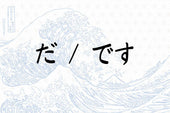
Understanding だ (da) and です (desu) in Japanese: Meaning and Usage
When learning Japanese, one of the first things you’ll come across is だ (da) and です (desu). These words don’t have a ...
-
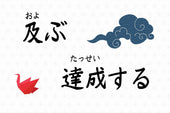
Difference Between 及ぶ (およぶ) and 達成する (たっせいする)
Both 及ぶ and 達成する can relate to "reaching" or "achieving" something, but they have distinct nuances and usage contexts...
-

JLPT N5 Study Guide: A Beginner's Roadmap to Acing the Test
If you’ve just started learning Japanese and are aiming to ace the JLPT N5, yo...
-

Beginner's Guide to Japanese Particles: Learn the Basics
TL;DR: Japanese particles are crucial for structuring sentences, acting like conjunctions or prepositions in English...
-

JLPT N5 Vocabulary List - All 748 Words You Need to Know
Vocabulary is the foundation of any language, and Japanese is no exception. The more you know, the better. Over time ...
-
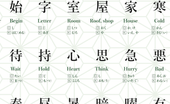
JLPT N4 Kanij List - All 176 Characters You Need To Know
After mastering the JLPT N5 kanji, you're ready to take your Japanese kanji game to the next level. JLPT N4. Let's go...
-
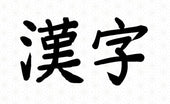
Kanji For Kanji - 漢字
Inception time. Which kanji compose the kanji of "kanji"? The kanji for "kanji" is actually pretty straightforward. I...
-

How to Memorize Katakana Easily: 9 Tips for Beginners
For those diving into Japanese, mastering hiragana and katakana is the first significant challenge. While hiragana o...
-
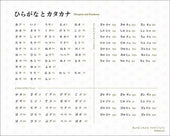
Complete Hiragana and Katakana Chart With All 112 Characters
The very first step for everybody who wants to learn Japanese is to study the hiragana and katakana chart (before lea...
-
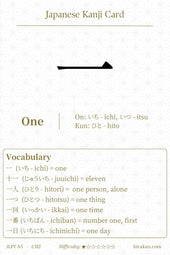
JLPT N5 Kanji: Kanji For One 一 (ichi)
Probably one the most simple kanji to remember, the kanji for 'one' is simply written '一'. Let's see its readings and...
-
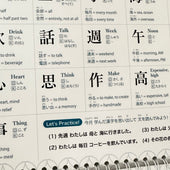
How Long Does It Take to Learn Kanji? A Beginner's Guide
Ask any Japanese student what's the scariest part of learning the language, and they'll say kanji. And they're righ...
-
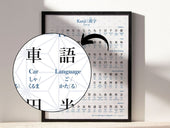
Is it Necessary to Learn Kanji? The Last Answer You'll Ever Need
Many beginners in Japanese wonder whether they should really learn kanji. I know this, because I also wondered when s...
-

How Long Does it Take to Learn Hiragana and Katakana?
As a beginner in Japanese, your first step is diving into the alphabets of Hiragana and Katakana. These are the build...
-

13 Best YouTube Channels to Learn Japanese, From Beginner to Intermediate
YouTube can be an incredible resource for learning Japanese. And best of all, it's free. So we've compiled a list of ...
-
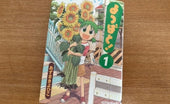
Top 10 Manga for Japanese Language Learners: From Beginners to Intermediates!
If you're learning Japanese, chances are you're interested in manga. So instead of reading texts about Tanaka-san s...

![~に来る – Expressing ‘Come to Do (Something)’ in Japanese [JLPT N5]](http://hirakan.com/cdn/shop/articles/ni-kuru-come-to-co.jpg?v=1769937520&width=170)
![~に行く – Expressing ‘Go Somewhere to Do Something’ in Japanese [JLPT N5]](http://hirakan.com/cdn/shop/articles/ni-iku-go-somewhere-to-do-something.jpg?v=1769937474&width=170)
![~にあります/~にいます – Saying Where Things and People Are in Japanese [JLPT N5]](http://hirakan.com/cdn/shop/articles/ni-arimasu-imasu-location-of-existence.jpg?v=1769251504&width=170)
![~がある・~がいる – Talking About What Exists in Japanese [JLPT N5]](http://hirakan.com/cdn/shop/articles/ga-aru-iru-there-is-are.jpg?v=1769251452&width=170)
![~すぎる – Saying Something Is “Too Much” in Japanese [JLPT N5]](http://hirakan.com/cdn/shop/articles/sugiru-too-much.jpg?v=1769251408&width=170)
![~く/~になる/~くする – Expressing Change with Adjectives in Japanese [JLPT N5]](http://hirakan.com/cdn/shop/articles/ku-naru-suru-expressing-change.jpg?v=1769251371&width=170)
![な形容詞 (Na-adjectives) – Basic Forms with です in Japanese [JLPT N5]](http://hirakan.com/cdn/shop/articles/na-keiyoushi-basic-desu-forms.jpg?v=1769251316&width=170)
![イ形容詞 – Basic i-Adjective Conjugations in Japanese [JLPT N5]](http://hirakan.com/cdn/shop/articles/i-adjectives.jpg?v=1769251251&width=170)
![~ます – Polite Present and Past Verb Forms in Japanese [JLPT N5]](http://hirakan.com/cdn/shop/articles/masu_-_polite_verb_form.jpg?v=1767433709&width=170)
![よ – Adding Friendly Emphasis in Japanese [JLPT N5]](http://hirakan.com/cdn/shop/articles/yo_-_ending_particle_Friendly_Emphasis.jpg?v=1767433517&width=170)
![ね – Softly Seeking Agreement in Japanese [JLPT N5]](http://hirakan.com/cdn/shop/articles/ending_particle.jpg?v=1766907843&width=170)
![何・だれ・いつ・どこ・どう – Basic Question Words in Japanese [JLPT N5]](http://hirakan.com/cdn/shop/articles/Question_Words.jpg?v=1766907708&width=170)
![ここ・そこ・あそこ・どこ – Talking About Places in Japanese [JLPT N5]](http://hirakan.com/cdn/shop/articles/places_fb57172a-7d06-47ee-a9b7-c1f4b6b2b264.jpg?v=1766305419&width=170)
![この・その・あの・どの – Using ‘This / That / Which’ with Nouns in Japanese [JLPT N5]](http://hirakan.com/cdn/shop/articles/acd351ada3fe4b04ae86de788a3350b8.jpg?v=1766305268&width=170)
![これ・それ・あれ・どれ – Saying ‘This / That / Which One’ in Japanese [JLPT N5]](http://hirakan.com/cdn/shop/articles/this-that.jpg?v=1766305107&width=170)
![か~か – Expressing Choices like “A or B” in Japanese [JLPT N5]](http://hirakan.com/cdn/shop/articles/choices.jpg?v=1766304827&width=170)
![~から~まで – Saying “From A to B” in Japanese [JLPT N5]](http://hirakan.com/cdn/shop/articles/from-AtoB.jpg?v=1765093560&width=170)
![まで – Expressing “Until” and “Up To” in Japanese [JLPT N5]](http://hirakan.com/cdn/shop/articles/until-up-to.jpg?v=1765093405&width=170)
![から – Expressing “Because” and “From/Since” in Japanese [JLPT N5]](http://hirakan.com/cdn/shop/articles/because-from_since.jpg?v=1765093285&width=170)
![や – Listing Examples with “And, Among Others” in Japanese [JLPT N5]](http://hirakan.com/cdn/shop/articles/and.jpg?v=1765093138&width=170)
![か – Forming Questions and Saying “Or” in Japanese [JLPT N5]](http://hirakan.com/cdn/shop/articles/ka-questions.jpg?v=1763787134&width=170)
![も – Saying “Also” and “Too” in Japanese [JLPT N5]](http://hirakan.com/cdn/shop/articles/mo-also-too_99f908e6-78d0-4f82-8319-391ef42764bc.jpg?v=1763787251&width=170)
![と – Linking 'And', 'With', and Quotations in Japanese [JLPT N5]](http://hirakan.com/cdn/shop/articles/to-and-with-quotation.jpg?v=1763265110&width=170)
![で – Marking Where and How an Action Happens in Japanese [JLPT N5]](http://hirakan.com/cdn/shop/articles/de-where-how-action-happens.jpg?v=1763264973&width=170)
![へ – Marking Direction ‘Toward’ in Japanese [JLPT N5]](http://hirakan.com/cdn/shop/articles/he-marking-direction.jpg?v=1762667986&width=170)
![に – Marking Time, Destinations, and Recipients in Japanese [JLPT N5]](http://hirakan.com/cdn/shop/articles/ni-marking-destination.jpg?v=1762667846&width=170)
![の – Possession and Noun Linking in Japanese [JLPT N5]](http://hirakan.com/cdn/shop/articles/no-possession-and-noun-linking.jpg?v=1761961297&width=170)
![を – Marking the Direct Object in Japanese [JLPT N5]](http://hirakan.com/cdn/shop/articles/o-direct-object.jpg?v=1761960990&width=170)
![が – Marking the Subject ('Who/What') in Japanese [JLPT N5]](http://hirakan.com/cdn/shop/articles/ga-subject-marker_60f30f70-6ca5-47ee-9a00-3646195d7d3c.jpg?v=1761386355&width=170)
![は (wa) – Topic Marker and Contrast in Japanese [JLPT N5]](http://hirakan.com/cdn/shop/articles/wa-topic-marker.jpg?v=1761385996&width=170)
![だ・です/だった・でした – Saying ‘to be’ in Japanese [JLPT N5]](http://hirakan.com/cdn/shop/articles/da-desu-datta-deshita_58bbc732-53fd-48da-83c7-4e477e7cc0b2.jpg?v=1760864506&width=170)

















